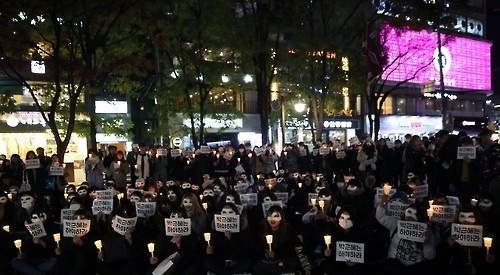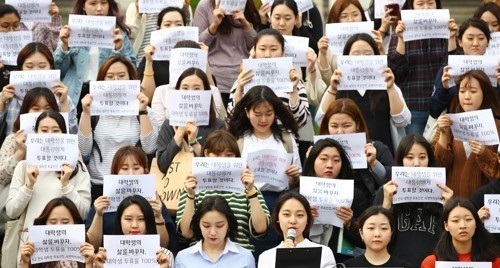Korean voters yearn for upright, competent, responsive leader
By a2017001Published : May 4, 2017 - 14:12
With the presidential election five days away, South Koreans are yearning for an upright, competent and responsive leader capable of navigating the country through daunting economic and security challenges and restoring its rattled justice and democratic system.
The May 9 poll comes on the heels of a massive corruption scandal involving former President Park Geun-hye that laid bare the country's flawed politics and deep-rooted corruption in the top echelons.
Disenchantment with status quo politics has galvanized voters, especially youth who used to be largely apathetic about politics due in part to cutthroat competition for jobs.

"I will definitely cast my ballot in the election to contribute to re-establishing our nation ... one in which our citizens are duly respected," Cheong Ha-jun, a 22-year-old university student, told Yonhap News Agency.
"My first participation in the presidential vote carries a special meaning as I believe we will prove by ourselves that citizens, after all, will move our country forward in the direction that we think is right," he added.
Cheong is among 6.76 million eligible voters in their 20s that account for nearly 16 percent of the total 42.48 million voters.
In a survey released last month by the national election management office, 84.2 percent of voters in their 20s and 80.9 percent of those in their 30s said they will actively participate in the election. The figures were about 10 percentage points higher than in the last presidential election in 2012.
For many young voters, the election is an extension of people's struggle for democracy that swamped the country for five months since the scandal broke in October and led to Park's ouster on March 10. Park is facing a trial on several charges including bribery and abuse of power.
The scandal, indeed, was a sobering lesson to the voters: a failure to pick the right leader triggers social and political confusion, and gets the country to veer off course in its efforts to boost economic growth and defense against a provocative North Korea.
"We have now become well aware of how important it is to pick the right leader, as we experienced (the trouble) that happens when we elect the wrong person for the top office," said Jung Su-jin, a 24-year-old student.
Kim Jang-won, a 36-year-old teacher in Seoul, said that the forthcoming election will be a crucial chance for the nation to get back on track after the leadership crisis triggered by the scandal.
"Through the vote, I hope we can give power to capable political forces ready to bring about a much-needed change to our country reeling from the scandal," he said.

As to the qualifications for the next president, the voters emphasized integrity, a clear statecraft vision and philosophy, not to mention a deeper grasp of their challenges, such as high youth unemployment and housing costs.
"What I look for first is integrity or ethical discipline as we have experienced an unprecedented leadership fiasco," said Park Jung-hyun, a 23-year-old voter in Seoul.
"We have witnessed that many politicians, once seen as clean, became corrupt when in exalted positions. ... I hope that the next leader will be one that we all can be proud of ... one that would not be swayed in the powerful post," he said.
For Hong Yu-taek, a 21-year-old student, the most pressing issue is whether the next president is capable of raising the minimum wage, which currently stands at 6,470 won ($5.72) per hour and securing more rental houses for students.
"As I have been doing a part-time job and living independently from my parents, my immediate concern lies in the more realistic issues, such as the minimum wage," he pointed out.
A "communicative leadership" is also an important qualification for the new president. Former President Park drew much flak for her lack of communication with the public and even her top aides.
"The next president must be more flexible, inclusive and capable of smoothly communicating with the public ... qualifications that the ousted president lacked," said Lee Soo-eun, a 23-year-old voter in Seoul.

Won Kyu-wang, a 48-year-old office worker in Goyang, northwest of Seoul, voiced hopes that the new president will give more effort to build public consensus on key policies.
"In many cases, citizens felt left out in the cold in the process of formulating key policies that affect their lives," he said. "I hope the new leader would care more about citizens' views and feelings."
Aware of voter attention to communication skills, leading presidential candidates, including front-runner Moon Jae-in, have pledged to reach out more to citizens and build closer ties with the media through unscripted meetings.
In light of persistent security threats from Pyongyang and increasingly complex geopolitics in East Asia, young voters also are paying close attention to the question of whether candidates are equipped with sufficient security and foreign policy chops.
"The next president must be able to deftly handle a string of foreign policy issues facing our nation. ... I hope he or she will project an image of a strong, competent leader on the diplomatic stage," Hong said.
The new president, if elected, will face the daunting tasks of coordinating security cooperation with Washington over a nuclear-ambitious Pyongyang, and easing historical friction with Tokyo and diplomatic tensions with China over the deployment of a US missile defense battery. (Yonahp)








![[Robert J. Fouser] Social attitudes toward language proficiency](http://res.heraldm.com/phpwas/restmb_idxmake.php?idx=644&simg=/content/image/2024/05/16/20240516050799_0.jpg&u=)

![[Graphic News] How much do Korean adults read?](http://res.heraldm.com/phpwas/restmb_idxmake.php?idx=644&simg=/content/image/2024/05/16/20240516050803_0.gif&u=)






![[Herald Interview] Byun Yo-han's 'unlikable' character is result of calculated acting](http://res.heraldm.com/phpwas/restmb_idxmake.php?idx=652&simg=/content/image/2024/05/16/20240516050855_0.jpg&u=)
